You may have heard that Brussels sprouts are bitter, mushy, or just plain unappealing, and you may even agree. Over the years, Brussels sprouts have unfairly gained a bad reputation.
We hope to change your mind about these nutrient–dense and flavorful veggies. They are in season from September through November, making them an excellent addition to your fall festivities. [1]
Why We Love Brussels Sprouts
- Brussels sprouts may be small but packed with nutrients, with six servings to a pound [1].
- They are a rich source of Vitamin C, a powerful antioxidant that helps strengthen our immune systems, repair tissues, and lower the risk of chronic disease. A half-cup of cooked Brussels sprouts provides over half the Vitamin C you need for a day [2].
- Brussels sprouts are also high in Vitamins A, B, K, Iron, and Calcium [1, 2]. These help keep our bones and heart healthy!
Selection
- When picking out Brussels sprouts, look for those that are bright green, small, and firm. They should be compact and uniform in size. [1]
- You can find Brussels sprouts sold individually or still attached to the stem, fresh or frozen. If you buy them on the stem, use the ones closest to the bottom first! This is because the bottom sprouts are the oldest and might go bad faster. [1,3]
- Choose young sprouts. Old sprouts have a strong, cabbage‐like odor. Avoid sprouts that have wilted or have yellow leaves. [3]
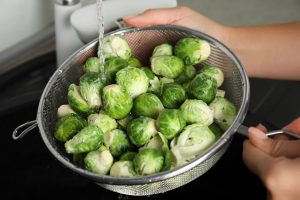 Cleaning and Storing
Cleaning and Storing
- You don’t need to wash or trim the Brussels sprouts before storing them in the refrigerator. You can keep them for up to a week in the refrigerator inside a perforated bag. If you cut Brussels sprouts in half, they may only stay good for about 3 days. [1]
- When cleaning Brussels sprouts, use a small knife to cut off and discard the stem. Rinse the Brussels sprouts under cool, running water. You can keep the sprouts whole or slice them in half. [4]
- Washing fruits and vegetables with soap or household detergents is not recommended by the Food and Drug Administration (FDA). If soap or detergent is absorbed by the fruit or vegetable you are washing, it can make you sick. [4]
- If you want to make Brussels sprouts last longer, consider freezing or even pickling them! For more information, check out the instructions linked above! [5, 6]
Cooking
Brussels sprouts are often roasted, but they can also be cooked on the stovetop, in a slow cooker, steamed, grilled, boiled, or even microwaved. With so many options, there’s a Brussels sprout recipe even for the skeptics. Check out some delicious options below!
- Roasted
A sprout classic! Roast your Brussels sprouts in the oven with a drizzle of olive oil. For extra flavor, add parmesan cheese!
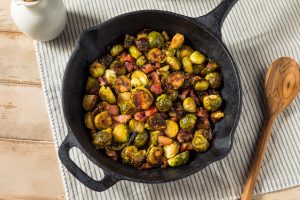
- Eaten raw in a salad
For a crunchy side dish, try adding Brussels sprouts to this winter salad.
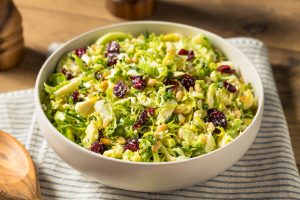
- With other in-season produce
Pair Brussels sprouts with other fall and winter veggies, like this mushroom sauce!
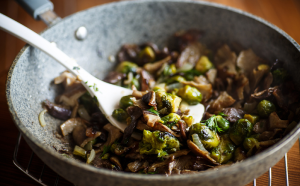
- Experiment with new flavors
Get creative by pairing roasted Brussels sprouts with unique flavors, like Greek yogurt and dill, for a fun twist on the classic roasted Brussels sprouts.
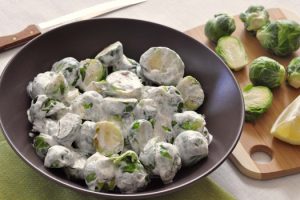
Have these ideas changed your mind about Brussels sprouts, or inspired you to use them in your diet? Keep exploring our blog and recipe pages for new recipes and ideas for using seasonal produce!
[1] https://www.canr.msu.edu/uploads/resources/pdfs/brussels_sprouts_(hni53).pdf
[2] https://fdc.nal.usda.gov/fdc-app.html#/food-details/169971/nutrients
[3] https://extension.usu.edu/nutrition/research/brussel-sprouts
[4] https://www.fda.gov/food/buy-store-serve-safe-food/selecting-and-serving-produce-safely
[5] https://www.glad.com/food-protection/protection-pointers/how-long-do-brussels-sprouts-last
[6] https://nchfp.uga.edu/how/can_06/pickled_cauliflower_brussel.html
Published on November 8th, 2023
Written by Abigail Klinker, MS, RD; Holly Cothern, Dietetics Student; Leah Capomaccio, Dietetics Student | Edited by Jung Sun Lee, PhD, RDN; Tristen T. Webb; and the nutrition education team